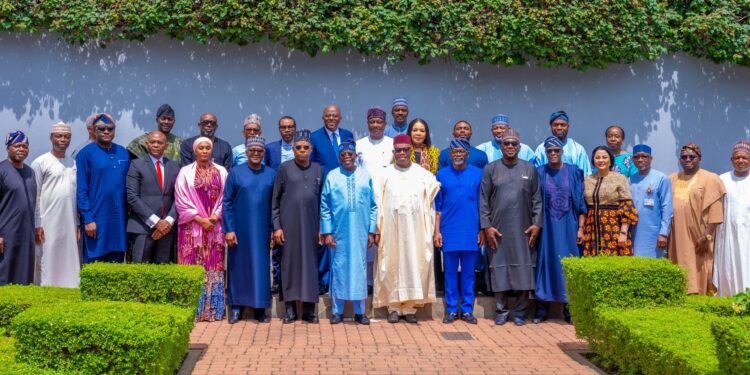A 31-member Presidential Economic Coordination Council (PECC) was on Thursday inaugurated in Abuja by President Bola Tinubu.
President Tinubu who is the Chairman of the Council also unveiled an Economic Stabilization Programme to ensure food security, improved power supply, enhanced social welfare and healthcare, increased energy production, and overall economic transformation.
Members from the Organized Private sector include Alhaji Aliko Dangote; Mr. Tony Elumelu; Alhaji Abdul Samad Rabiu; Ms. Amina Maina, Mr. Segun Ajayi-Kadir; Dr. Funke Opeke; Dr. Doyin Salami; Mr. Patrick Okigbo; Mr. Kola Adesina; Mr. Segun Agbaje; Mr. Chidi Ajaere; Mr. Abdulkadir Aliu; and Mr. Rasheed Sarumi.
Speaking at the inaugural meeting of the Council, Tinubu stressed the need for innovative solutions to the country’s economic challenges and the importance of public-private partnerships in driving economic reforms.
Acknowledging the challenge of energy security in the country, the President underscored the need to work together to improve the nation’s oil and gas sector, while increasing electricity generation and distribution nationwide through cooperation and collaboration.
”We must increase our oil production to two million barrels per day within the next few months. We are determined to remove all entry barriers to investments in the energy sector, while enhancing competitiveness,” the President stated.
He announced measures to stabilize the economy, enhance job creation, and foster economic security. These measures would run concurrently with the National Construction and Household Support Programme,.
Under the Economic Stabilization Programme, issues to focus on include Energy Security Initiative, which includes power, oil and gas, to increase on-grid electricity supply to homes and businesses from about 4.5 gigawatts to 6 gigawatts in six months; increase oil production to 2 million barrels per day within the next 12 months, and remove barriers to entry for investments into the sector to enhance competitiveness.
On Agriculture and Food Security, the focus would be to increase staple crops grown by small-holder farmers from 127 million metric tons (MT) in 2023 to 135 million MT this year; increase food production by partnering larger-scale commercial farmers, and support qualified farmers with satellite imagery for land use planning, crop rotation, and monitoring of agricultural expansion.
On Health and Social Welfare, the target will be making essential medicines available at lower cost for 80-90 million Nigerians; expanding healthcare insurance coverage for one million vulnerable people via a Vulnerable Group Fund in collaboration with state governments; redeploying 20,000 healthcare workers to provide services to 10-12 million patients in areas where they are most urgently needed, and powering up 4,800 primary healthcare centres (PHCs), and hospitals using renewable energy sources.
Under fiscal measures, attention would be given to interventions to improve access to finance for the housing sector, micro, small and medium enterprises (MSMEs), and the manufacturing sector, particularly youth-owned enterprises.
This would be through ssupport for new and existing youth-owned enterprises across all 36 states of the Federation, creating 7,400 MSMEs within the next 6-12 months; providing N650 billion lower-cost short-term financing to youth-owned businesses, manufacturers and MSMEs across various industries; food processing, pharmaceutical, agriculture, and wholesale and retail trade.
Also, a Manufacturing Stabilization Fund to disburse lower cost (9.0%-11.0%) long-term financing to about 250 large, medium-scale, and light manufacturers that produce finished goods for domestic and export markets, while Sub-national Matching Fund under a “Grow Nigeria Development Fund” of a single-digit interest rate loan with the Bank of Industry and a matching fund agreement with sub-national governments to grow MSMEs.
The government also plans to expand the Bank of Industry’s Rural Development Programme to support rural economies in developing 300 new MSMEs for each state, including the Federal Capital Territory (Abuja), resulting in 11,100 new rural-based MSMEs across the Federation;
The Mortgage Finance Acceleration Facility would facilitate the delivery of affordable housing for all segments impacted by the cost-of-living challenge through the construction of an additional 25,000 housing units.
“These fiscal measures will improve access to finance for MSMEs and, in the process, create 4.7 million direct and indirect jobs over a six to 12-month period,” the statement said.
Vice-President Kashim Shettima, who is the Vice-Chairman of the Council, said the government was committed to proffering solutions to the nation’s economic challenges and not apportioning blame.
In his presentation, the Coordinating Minister of the Economy and Minister of Finance, Wale Edun, highlighted the key elements of the Accelerated Stabilization and Advancement Plan earlier submitted to the President.
These included details of economic issues to be resolved in 2024 by sub-committees in the key sectors of agriculture and food security, energy (oil, gas, power), health and social welfare, and business support.




